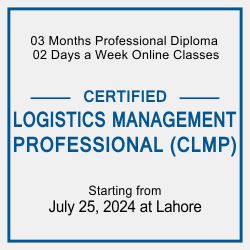
CERTIFIED LOGISTICS MANAGEMENT PROFESSIONAL (CLMP)
PIQC’s The Certified Logistics Management Professional (CLMP) course is a comprehensive three-month program designed to equip participants with the knowledge and skills required to excel in logistics management. This course is designed and delivered by highly qualified instructors and industry practitioners, covering a wide range of logistics topics, from automation and artificial intelligence to material handling systems and export management.
This course is taught by highly qualified instructors who are practically knowledgeable and experienced in the relevant fields. This is an ideal course for all those who do not have any academic background in Logistics Management.
There are several reasons to join our CLMP program i.e. for professional development, improving organizational performance, improved customer satisfaction, your personal growth as well as career advancement.
PIQC’s (CLMP) is a certification/diploma that will be widely recognized and is considered as a symbol of professionalism and expertise in the field of Logistics Management within and outside the country, and it is a road map to success in your professional career.
LEARNING OUTCOMES
Upon successful completion of this program, the participants will be able to:
- Understand the fundamentals of logistics management and its various functions.
- Gain insights into the latest trends in automation and artificial intelligence in logistics.
- Develop practical skills in material handling, packaging, and vehicle routing.
- Learn the intricacies of import and export management.
- Master the principles of freight forwarding, order picking, and network design.
- Acquire comprehensive knowledge in transport management and related systems.
- Understand sustainability and reverse logistics practices.
- Manage supply chain risks effectively.
- Stay updated with emerging technologies in logistics
COURSE CONTENTS
Module 1: Logistics Management
This module provides an in-depth understanding of logistics management, including its fundamental functions and various types. Participants will learn to measure logistics performance using the Logistics Performance Index and explore the impact of automation and artificial intelligence on business logistics systems. The integration of logistics into the value chain and a case study on the China-Pakistan Economic Corridor (CPEC) will also be covered.
Module 2: Material Handling Systems
This module covers the essential aspects of material handling systems, focusing on the selection and replacement of equipment. Participants will gain insights into different material handling systems and the criteria for choosing the right equipment for their needs.
Module 3: Packaging
Participants will explore the critical functions of packaging in logistics, including different types of containers and methods for calculating their efficiency. This module emphasizes the importance of packaging in protecting goods and optimizing space during transportation.
Module 4: Vehicle Routing and Scheduling
This module delves into the principles of vehicle routing and scheduling, including multiple routing strategies. Participants will learn about the Sweeping Method and Saving Method, which are essential for optimizing routes and schedules in logistics operations
Module 5: Import Management
Participants will gain a comprehensive understanding of import management, focusing on the required documentation and the customs clearance process. This module also covers trade payments, Incoterms, and the WEBOC system, providing a holistic view of import operations.
Module 6: Freight Forwarding
This module introduces the fundamentals of freight forwarding, including best practices for safety and security in shipping and air cargo. Participants will learn about the roles and responsibilities of freight forwarders and the processes involved in managing freight operations efficiently.
Module 7: Order Picking and Stacking System
Participants will learn about different order picking systems and the decisions involved in storage and handling. This module emphasizes the importance of efficient order picking and stacking systems in optimizing warehouse operations and reducing handling times.
Module 8: Export Management
This module covers the critical aspects of export management, including documentation and legal compliance. Participants will learn to handle LC discrepancies, understand export control sanctions, and navigate the SWO system, ensuring smooth and compliant export operations.
Module 9: Network Design
Participants will explore various types of network designs and methods for estimating transport costs. This module includes network analysis techniques that are essential for designing efficient logistics networks that minimize costs and maximize service levels.
Module 10: Transport Management
This module provides an overview of different transport systems, choices, and selection criteria. Participants will learn about TIR, multi-modal transport, and Break weight calculations, gaining a comprehensive understanding of transport management in logistics.
Principles of Management, organizational structures, leadership, motivation, organizational culture and group dynamics
PROJECT
The participants are required to work on real life projects on selected topics and tools, preferably from the organizations in which they are working. The projects will be of a practical nature and should be completed within the stipulated time frames. A project report will be submitted in accordance with the laid down criteria, format and coverage
FACULTY
The faculty is derived from a pool of qualified practitioners and academicians with sound track record and expertise in the field
COURSE MATERIAL
Course material, class notes and slides will be provided by trainers in hard/soft form
PRE-REQUISITES
Graduation in any field with good academic results
CERTIFICATION
Qualified participants will be awarded with a Certification upon completion of course material, as well as qualifying the exam and the assigned project who will be proficient in QA and its related activities.
TEACHING STRATEGIES
This is a professional course and will involve a number of higher-level teaching methodologies. The course is spread over four months to allow inter-session study. In this respect participants will have to carry out timely study, investigations, and assignments to grip the subject. Discussions in the class are focused on the key points, create critical thinking, share experiences of fellow professionals and build professional maturity
Duration: 3 Months
Mode of Instructions: Online Via MS Teams
Venue: Lahore